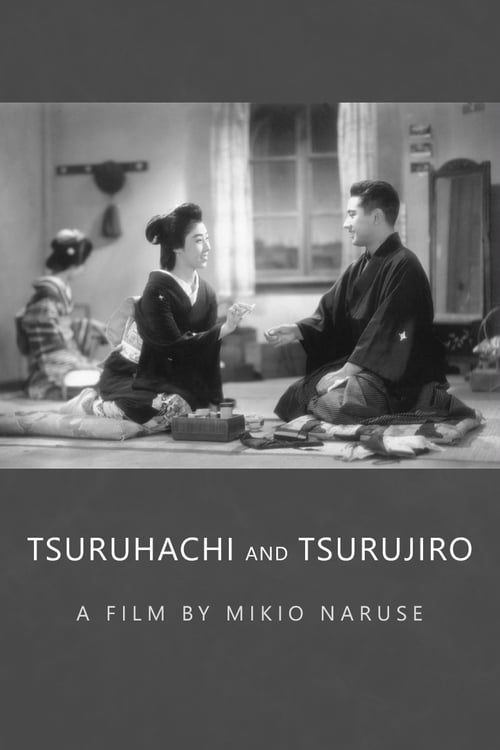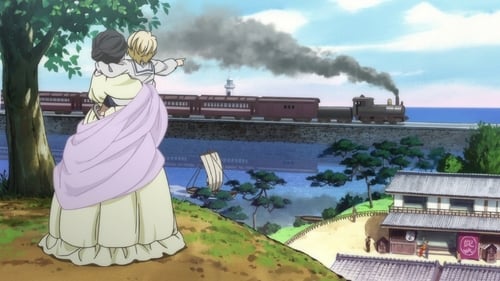鶴八鶴次郎
(9 votos)
?
?

Recomendados

Senritsu Kaiki File Super Kowa Too! Fear Adventure: Kokkuri-san
Based on the previous 'Final Chapter', world history has now been modified and reconstructed. Although Kudo was able to release himself from the curse caused by demon soldiers, he now has no money. Despite losing the memory of the previous world, Kudo, Ichikawa and Tashiro continue to work together in producing a horror documentary.

Phantom Cowboys
Part time capsule, part folk song, Phantom Cowboys follows three teenage boys as they approach adulthood in vastly different parts of the United States. Moving fluidly between the deserts of California, the valleys of West Virginia, and the sugarcane fields of Florida, the film explores the lives of these young men during two formative periods - transitioning forward and backward in time over a span of eight years.

A Long Way Home
A Long Way Home takes us on a fascinating journey into both the grim days of recent Chinese history and the dazzling cultural scene in present-day China. The film centers around five of the most significant representatives of contemporary Chinese counterculture: the visual artists the Gao Brothers, the choreographer and dancer Wen Hui, the animation artist Pi San and the poet Ye Fu. With bravery and subversive wit, they each shed light on the social problems in their country. In doing so, the film poses universal questions that ultimately concern us all: which values determine our cultural identity and in what kind of world do we want to live.

Two Mementos
Set in Bandang in early 1930s, story concerns a young man who joins the anti-Dutch freedom movement. When his best friend is shot by police, he vows to assassinate the chief of police who gave the order to fire.

Mystic Christmas
During the holidays, Juniper reconnects with the owner of the pizza shop in to Mystic, Connecticut, where she's working at the rehabilitation center and aquarium.

The Poughkeepsie Shuffle: Tracing 'The French Connection'
A documentary on the production of The French Connection (1971).

Celldweller: Start of an Empire (The Making of
Witness the creation of the Celldweller album "End of an Empire" as Klayton gives you an unprecedented behind the scenes look in this feature-length documentary. From musical direction to art design, staff meetings and interviews with the FiXT team and Klayton himself, "Start of an Empire" shows how the iconic album came to life. From writing, recording, engineering, producing, mixing and mastering the album entirely by himself, to uncovering some of the inner workings of his label, FiXT and the team he surrounds himself with, Start of An Empire provides an intimate commentary on the man behind the iconic red mohawk. Experience the music, art & creation of the promotional videos behind TIME, LOVE, DREAMS & DEATH, the 4 chapters from End of an Empire, from the other side of the lens.

Tuff Guy
Following an inappropriate remark towards a woman, a young man finds himself plunged into a parallel world where he will endure a series of remarks and micro-attacks usually reserved for women.
Semelhantes

Meu Casamento Feliz
Uma jovem infeliz de uma família abusiva é casada com um comandante do exército temível e frio. Mas os dois aprendem mais um sobre o outro, o amor pode ter uma chance.

A História de Hachiko
Conhecido como sinônimo da fidelidade por todo Japão, o filme traz a história da vida de um cachorro chamado Hachiko. Nascido em um bairro de Akita, o cachorrinho foi entregue à família do Dr. Hidesaburo Ueno, um professor da Universidade de Tóquio e recebeu o nome de Hachi, que depois passou a ser chamado carinhosamente pelo diminutivo Hachiko. Ao crescer, tomou hábito de acompanhar o professor até a estação de trem de Shibuya de manhã e buscá-lo à tarde. Um dia, o professor sofre um AVC durante uma reunião do corpo docente na universidade e não volta mais. Mas Hachiko continua no seu dever de buscá-lo na estação de Shibuya, todos os dias, faça sol ou faça a chuva.

A Mulher Inseto
É entre os camponeses, os miseráveis, os gângsteres e as prostitutas que Imamura encontra terreno fértil. A Mulher Inseto (Nippon Konchuki, 1963), uma de suas obras-primas do período, conta a história de uma camponesa que, tal como um inseto, faz sua escalada da sobrevivência. Tendo atravessado, desde a adolescência, a violência sexual e o incesto, sua mudança para a cidade grande a conduz diretamente à prostituição e afinal ao controle de um bordel, onde passa a praticar toda sorte de atos vis, dos quais antes fora vítima. O tratamento do personagem como uma verdadeira heroína é absolutamente novo no até então moralista cinema japonês. E as tomadas de estilo documental, nas quais freqüentemente o personagem principal não passa de uma cabeça perdida na multidão das ruas da cidade, propõem exatamente o oposto das imagens de estúdio da Shochiku, sempre bem compostas e nítidas.

Father of the Milky Way Railroad
Cinebiografia baseada na vida do poeta e romancista Kenji Miyazawa, um dos autores de histórias infantis mais lidos e amados do Japão. A história traça a vida breve, porém incrível, do genial escritor através de sua relação com seu amoroso pai Masajiro, um próspero agiota e homem moderno da era Meiji que luta para acompanhar as ambições excêntricas de seu filho.

菊とギロチン
Na sequência da agitação social causada pelo Grande Terremoto de Kanto de 1923, duas atletas de sumô feminino, Kiku e Tokachi, e um grupo anarquista chamado Sociedade Guilhotina criam um vínculo improvável.

Haikara-san ga Tooru Movie 2: Hana no Tokyo Dai Roman
A história segue Benio "Haikara-san" Hanamura, que perdeu a mãe quando era muito jovem e foi criada por seu pai, um oficial de alto escalão do exército japonês. Como resultado, ela se tornou uma moleca. Ao contrário das noções japonesas tradicionais de feminilidade, ela estuda kendo, bebe saquê, veste-se com roupas ocidentais muitas vezes bizarras em vez do quimono tradicional e não se interessa tanto pelo trabalho doméstico quanto pela literatura. Ela também rejeita a ideia de casamentos arranjados e acredita no direito da mulher a uma carreira e ao casamento por amor.